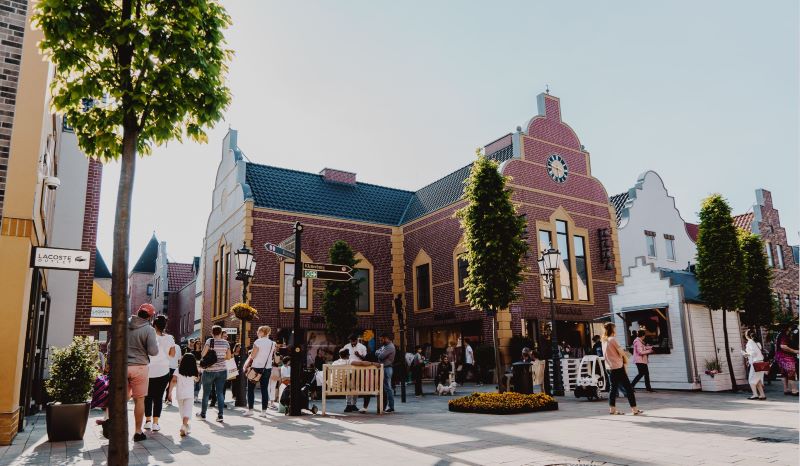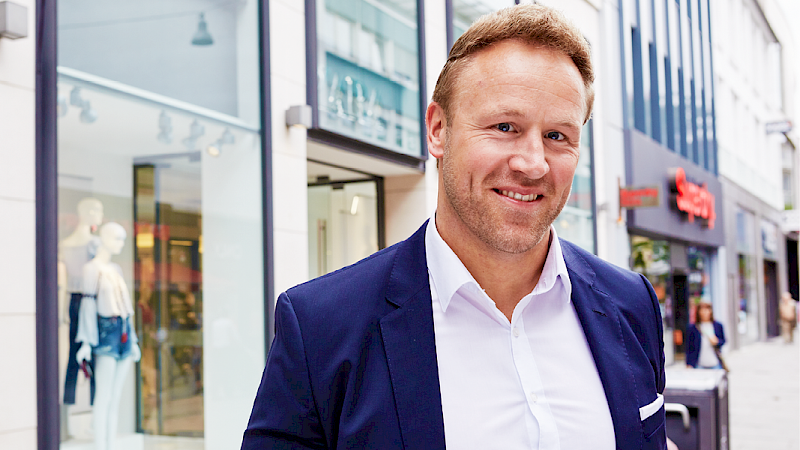Coronavirus crisis provides retail with unexpected opportunities
Andreas Grüss: ‘Small towns are currently enjoying increased customer frequency’
It is undisputed that the retail sector has suffered immensely from the coronavirus crisis and the associated economic consequences. While the willingness of customers to shop in the metropolises and large cities still leaves a lot to be desired due to the prevailing restrictions, small towns currently seem to be experiencing a surprising economic upswing. Despite all the euphoria, however, experts warn that this is only temporary.

It is summer 2019, the year before the outbreak of coronavirus. In many places, small German towns are bemoaning the increasing vacancy of retail space. There is talk of the ‘extinction of retail’. Retailers are more concerned with creating concepts to ‘revitalise the market’ than with selling their goods. Affected industry players wonder who is supposed to buy the products. The consumers spending sprees seem to have been satisfied by the online retailers. People have apparently reached a saturation point with shopping. And those who haven't are drawn to the big cities, which usually have much more to offer in terms of shopping experience.
Admittedly, this is a rather striking portrayal of the problem faced by merchants in small towns. Nevertheless, it describes the complex issues with regard to their economic future quite accurately. However, not all companies have to face these challenges to the same extent. The small grocer on the corner is often not nearly as well positioned operationally and strategically as, say, the global fashion chain or the electronics retailer. And yet they are in the same boat. After all, only the right mix of suppliers – namely grocery stores and large-scale retail chains – often has the appeal that lures us into the sales areas and ultimately to the checkouts.
Today, one year later, one might think that coronavirus has made the situation even worse for the vendors in those small towns. But the opposite currently seems to be the case. ‘At the moment, retailers in many small towns are enjoying an increase in customers’, emphasises Andreas Grüß, Managing Director at the Lührmann Group, which specialises in the leasing and sale of commercial properties in prime city centre and Big Box Retail locations and has offices in Osnabrück, Berlin, Düsseldorf, Munich, Hamburg and Frankfurt. ‘People are increasingly shopping locally these days, literally on their own doorstep’, he states.

Restrictions on public life and compulsory face masks in shops do dampen the mood for shopping when it comes to travelling further distances, e.g. to take advantage of a more diverse range of products on offer in large cities. However, it presumably reinforces the consumers’ feeling that they can support regional trade with their purchases. So why travel far afield for a dull shopping experience when I can find it right on my own doorstep and my money can largely benefit the local economy?
At the same time, this assumption should not make us forget that the currently strongly reduced tourism flow in the big cities has a huge influence on the statistics and the estimates of the experts. The comparison between small and large cities therefore lags a little, but the core message remains: ‘The smaller cities should use the positive development to present themselves to consumers with innovative retail and city centre concepts’, emphasises Andreas Grüß.
The fact that he could be spot on with his theory is backed up by the statements of various industry players. Unfortunately, none of them were willing to make a public statement. ‘On the subject of coronavirus, the trade is highly sensitive,’ confirms the Osnabrück real estate expert. They don’t want to go too far out on a limb and it's best not to associate the company with the coronavirus crisis in any way in the first place. However, representatives of large retail chains and specialist stores confirm Grüß's assumption off the record.
‘We are actually recording a comparatively higher number of customers at our locations in small towns than in previous years’, an expansion manager of a large fashion chain told us. However, this was only a temporary snapshot of the present situation. It remained to be seen to what extent the general conditions would develop in the coming weeks and months. He and other voices from the industry caution that retailers should not assume that people’s current consumer behaviour would become permanently entrenched. As soon as the daily shopping routine would reasonably normalise and the restrictions be greatly reduced, it must be expected that people would fall back into their old habitual patterns and be increasingly attracted again to the large cities and metropolitan areas where an even better shopping experience is usually on offer.
The experts’ assessments are supported by actual customer frequency figures. The hystreet.com platform collects such valid data and makes it available to interested parties free of charge. The operators see their service as a useful decision-making aid for retailers and city centre stakeholders for the positive development of city centres. ‘We can confirm that there is currently a shift in customer flows’, says Nico Schröder, Managing Director at hystreet.com. The current numbers collected in July 2020 are unequivocal. At the same time, Schröder emphasises that – due to the prevailing measures to contain the coronavirus and reduce long-distance travel accordingly – many Germans are rediscovering their inner cities during the summer holidays.

Those responsible in the small towns would therefore be well advised to see this temporary good mood now as an opportunity to optimise their sales concepts and ‘not put the issue on the back burner’, recommends Grüß. Which customer demands are particularly important to promote? Which mobility concepts of the future are promising and a suitable solution for the existing infrastructure? Which vendor mix and product portfolio should you choose? These and many other questions need to be addressed. ‘Not all small towns will find the appropriate answers to these questions’, Andreas Grüß laments. But where cooperation between local retailers, trade associations and politicians works well, it is likely that suitable concepts will be established in close cooperation with all parties involved.
The example of the encouraging momentary increase in customer frequency in small towns nevertheless shows quite clearly that it is also possible to draw a positive effect from the coronavirus crisis. ‘Namely, to be able to seize the opportunity to build on the current, rather positive regional situation and to lure customers back to the city centres far away from the metropolises with suitable concepts in the medium and long term’, emphasises Grüß.
Now, at the latest, is therefore the right time in the small towns to introduce the returning customers to the advantages of the regional shopping and experience landscape. The focus should not only be on the infrastructural advantages. Andreas Grüß is convinced that ‘it all depends on the successful composition of architectural attractions, cultural offerings and a broad portfolio of providers’. If this composition played the appropriate music, then more people would come to the concert.
About us
We connect potential – as Germany’s real estate specialists for prime locations. There is a perfect location for every brand, every tenant and every project. Lührmann Germany, headed by Managing Directors Achim Weitkamp, Mario Hampel and Michael Backhove, operates from six locations. Berlin, Düsseldorf, Frankfurt, Hamburg, Munich and Osnabrück form the optimal network to consolidate our expertise in the business areas of Retail, Office, Hotel & Hospitality, City Investment and Big Box Retail for you. This enables us to reach all locations in German metropolitan regions within a very short time. And our excellent knowledge of properties, people and markets, combined with a passion for the perfect deal, provide the conditions for a perfect match. And this has been the case since 1992.
Press contact
Regine Hoffmeister
Tel +49 (0)541 2 99 99 68
www.luehrmann.de